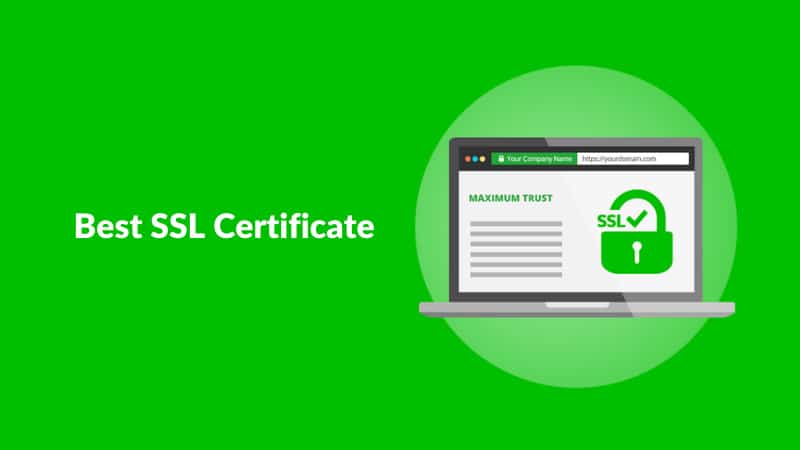Introduction: Why SSL Certificates Matter for Your Website
Making sure your website is secure is more crucial than ever in the modern digital age. Using an SSL (Secure Sockets Layer) certificate is one of the best ways to safeguard your website and its users. An SSL certificate protects sensitive data, including credit card numbers, passwords, and personal information, by encrypting the data that is transferred between your website and its users.
However, with so many varieties available, each with a unique level of protection and function, selecting the best SSL certificate for your website might be a little intimidating. Depending on your unique requirements, this article will help you choose the best SSL certificate for your website by guiding you through the process.
What Is an SSL Certificate and How Does It Work?
It’s crucial to comprehend what SSL is and how it works before delving into the many kinds of SSL certificates.
An SSL certificate is a type of digital certificate that encrypts data sent between the user’s browser and the server and verifies the legitimacy of a website. HTTPS (HyperText Transfer Protocol Secure) is enabled instead of HTTP when an SSL certificate is installed. With encryption to stop hackers from intercepting or altering data, the “S” in HTTPS signifies that the website is safe.
An SSL-secured website uses an encrypted connection between the user’s browser and the website’s server. This guarantees that private information, such payment details or login credentials, is shielded from malevolent third parties.

Types of SSL Certificates: Which One Is Right for Your Website?
SSL certificates come in a variety of forms, each appropriate for a particular use case and validation level. The security requirements of your website and the degree of trust you want to instill in your users will determine the type of SSL certificate you select.
1. Domain Validated (DV) SSL Certificate
The simplest and most straightforward SSL certificates are Domain Validated (DV) ones. These certificates confirm that the individual requesting the certificate is in charge of the domain and that the domain name is registered. They don’t need a lot of authentication or further company information.
Ideal For:
Individual blogs or websites
Startups or small enterprises
Websites that don’t deal with private data
Although DV SSL certificates offer security and encryption, they don’t give users any assurance about the website owner’s trustworthiness.
2. Organization Validated (OV) SSL Certificate
Compared to DV certificates, Organization Validated (OV) SSL certificates need more thorough inspection. The certificate authority (CA) not only validates domain ownership but also the validity of the company requesting the certificate. This entails verifying the organization’s legitimacy by looking up pertinent information and business registration details.
Ideal For:
Small and medium-sized enterprises
Websites that offer services or goods or gather personal data
Websites for businesses and e-commerce where trust is crucial
OV certificates show the corporate name in the certificate details and provide a higher level of confidence than DV certificates. They boost user confidence by offering encryption and verifying the organization’s authenticity.
3. Extended Validation (EV) SSL Certificate
The highest level of security and validation is provided by Extended Validation (EV) SSL certificates. The CA performs a thorough verification procedure in order to issue an EV certificate, which includes verifying the organization’s operational, legal, and physical presence. Additionally, EV certificates cause a visual cue to appear in the user’s browser, like a green address bar or the name of the business next to the URL.
Ideal For:
Websites for e-commerce that handle transactions
Websites and financial organizations that deal with sensitive data
Websites where the highest level of security and trust are essential
For websites that want the highest level of security and wish to send a clear sense of authenticity and trust to visitors, EV SSL certificates are strongly advised. Most contemporary browsers display the organization name or green address bar, which contributes to increased user confidence.
4. Wildcard SSL Certificate
You can use a single Wildcard SSL certificate to secure a domain and all of its subdomains. If your major domain is “example.com,” for instance, a Wildcard SSL certificate will protect “blog.example.com,” “shop.example.com,” and any additional subdomains you might have.
Ideal For:
Multiple subdomain websites
Companies seeking an affordable way to protect several subdomains
Frequently generated subdomains on websites
Because wildcard SSL certificates do not require separate certificates for each subdomain, they are perfect for companies that oversee multiple subdomains.
5. Multi-Domain SSL Certificate
You can use a single SSL certificate to secure several domain names using a multi-domain certificate. For companies who want to simplify their SSL maintenance and run several websites under several domain names, this is perfect.

Ideal For:
Multiple domain name websites (such as “example.com,” “example.net,” and “example.org”)
Companies that oversee several brands or local locations
Businesses looking to streamline SSL administration
Multi-domain SSL certificates are an affordable option for businesses with multiple websites since they provide flexibility and simplicity.
How to Choose the Right SSL Certificate for Your Website
Take into account the following elements while selecting the best SSL certificate for your website:
1. Website Purpose
Ascertain the purpose of your website. A DV certificate can be adequate if the website is an informational or personal blog. An OV or EV certificate is better suitable, though, if you intend to handle sensitive data, such credit card numbers or user information.
2. Level of Trust
To what extent do you wish to inspire trust in your users? With visual cues like the green address bar, EV certificates provide the highest level of trust, which is advantageous for websites where user confidence and security are crucial.
3. Budget
The cost of various SSL certificates varies, with EV certificates being the most costly. Think about your spending limit and whether an EV or OV certificate’s increased security and credibility make the expense worthwhile. For blogs or smaller websites, a DV certificate might be adequate.
4. Number of Domains/Subdomains
You might want to choose a Wildcard or Multi-Domain SSL certificate if you have several subdomains or domain names. By allowing you to secure many websites under a single certificate, these certificates save you time and money compared to buying SSLs separately.
Conclusion: Securing Your Website with the Right SSL Certificate
Selecting the appropriate SSL certificate is essential to guaranteeing the safety of your website and safeguarding the private information of your users. Whether you manage a huge organization, e-commerce site, or personal blog, choosing the right SSL certificate can help increase trust, boost SEO ranks, and protect your website from online attacks.
Consult an expert to assess the demands and security requirements of your website if you’re not sure which certificate is best for you. Whichever solution you decide on, installing an SSL certificate is a crucial first step in protecting your website and giving users a safe online experience.






